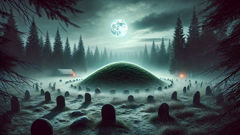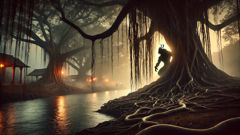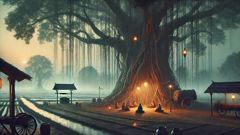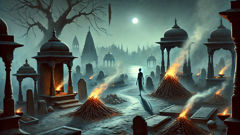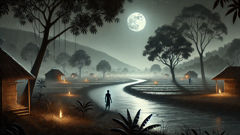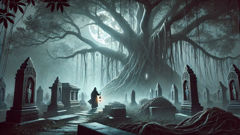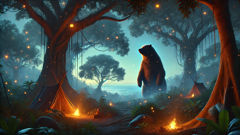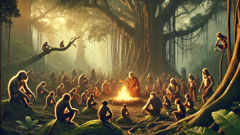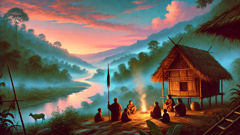Introduction
In the far north of medieval Norway, beyond the stony fjords and dense birch forests, lay the isolated village of Nordheim—a place where the land met the sea in a jagged embrace and the midnight sun seemed always to hover just below the horizon. Here, the wind howled with the voices of ancestors, and the forests whispered secrets to those who dared to listen. Ancient burial mounds dotted the hillsides, their grassy domes rising like silent sentinels above the frostbitten earth, and it was said that not all who were laid to rest within them remained at peace. Villagers spoke of the Draugr, the restless dead, guardians of their own tombs, animated by anger or unfinished purpose. To the people of Nordheim, these tales were not mere stories—they were warnings woven into the fabric of everyday life. Children grew up with the taste of fear, learning to respect the mounds and leave offerings at their edges. On storm-laden nights, when the wind carried the scent of brine and decay, doors were barred tight and hearths kept burning until dawn. Yet, as the nights stretched longer and the shadows grew bolder, an unease settled upon Nordheim—a sense that something old and malignant had awakened. In the heart of this uncertainty stood Eirik, a young man marked by both curiosity and sorrow, drawn to the mysteries buried beneath the earth. He had heard the stories all his life, but nothing could prepare him for the darkness rising from the ancient barrow on the edge of the village—a darkness that threatened not just his home, but the very soul of Nordheim itself.
I. Shadows in the Mound
Eirik often found himself wandering the low hills beyond Nordheim’s palisade, his boots crunching over frost-stiffened grass as the sun slipped behind veils of cloud. The village had always been wary of its burial mounds, but Eirik’s fascination with what lay beneath was both a source of pride and private shame. He was the son of Ingrid the Healer and grandson to Rolf, who’d once sailed with great kings. Yet unlike his forebears, he carried more questions than certainty.
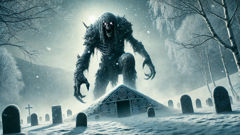
The mound known as Skjoldhaugen loomed larger than most—a broad dome wreathed in ancient birch trees and ringed with carved stones inscribed by unknown hands. Old tales named it the resting place of Skjold, a chieftain whose greed and violence had darkened the land long before Eirik’s birth. Some whispered that Skjold’s gold still lay buried with him, but others said his anger had not faded in death. Every year at midwinter, Nordheim’s folk left offerings: mead, bread, a handful of dried berries. It was a peace made with fear, a hope that the mound would remain undisturbed.
That winter, however, the peace was broken. Animals began to vanish—goats and chickens found dead with signs of violence no fox or wolf could make. A chill settled over the village, thick as a burial shroud. Even Ingrid felt it in her bones, lighting more candles than usual and keeping Eirik close at night. The elders muttered about old wrongs unrighted, but none dared approach Skjoldhaugen after dusk.
Eirik, restless and plagued by dreams, resolved to discover the truth. One evening, as snowflakes tumbled from the violet sky, he crept from his home and made his way towards the mound, clutching a torch and his father’s seax. Each step was heavy, the world muffled by snow and the pounding of his heart. At the edge of the mound, he paused, the torchlight flickering across runes carved deep into standing stones. The shadows seemed to writhe, and a low, inhuman moan drifted from beneath the earth.
Driven by both terror and determination, Eirik pressed forward, kneeling by the mound’s entrance—a narrow opening hidden among brambles. He whispered an old prayer, the words trembling in his throat. Suddenly, the ground shifted beneath his hand. A skeletal hand burst from the soil, clutching at his wrist with impossible strength. Eirik screamed, wrenching himself free and stumbling backwards as the earth heaved. From the mound’s heart emerged a figure—bloated, blackened by death, clad in rusted mail and ragged furs. Its eyes glowed with an eldritch light, and its mouth gaped in a wordless howl.
Eirik ran, heart slamming in his chest, not daring to look back. He could hear the scrape of armored limbs and the crunch of frozen grass behind him. Only when he reached the safety of his mother’s hearth did he collapse, gasping and wild-eyed. Ingrid, recognizing the truth in his terror, called for the elders. That night, the people of Nordheim learned that Skjold’s rest had been disturbed, and the Draugr walked again.
II. The Curse Unleashed
The village descended into chaos after Eirik’s harrowing encounter. Livestock continued to disappear, but now there were other signs: doors splintered during the night, a foul stench drifting on the wind, icy handprints pressed into the snow. Children whispered of seeing a hulking shadow near the edge of the woods, and the bravest men returned from searches with terror written on their faces. At night, an unnatural cold seeped through walls, extinguishing even the strongest fires.
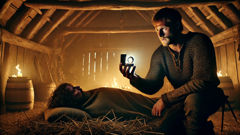
Eirik struggled with guilt—had his curiosity awakened the Draugr? Ingrid tried to comfort him, but her own eyes grew hollow with fear. The village’s council convened, their voices tense and urgent. Ragnvald, the oldest among them, spoke of old lore: “A Draugr is no mere ghost. It is flesh bound to rage and greed, a corpse unwilling to yield its treasures or forgive its grudges. Only those of courage or blood can face it.”
Torleif, the blacksmith, suggested burning the mound—a notion met with horror. Ingrid, versed in ancient ways, argued for a ritual of binding. “But to enter Skjoldhaugen is to risk death,” she warned. Yet what choice remained? Eirik felt the weight of destiny settle upon him. He was no warrior, but the Draugr had seized upon his soul as surely as it haunted Nordheim.
That night, Eirik dreamed again. He wandered endless tunnels beneath the earth, following a faint light that flickered like hope. The path led to a great hall filled with bones and rusted blades. Upon a throne of stone sat Skjold, his rotted face twisted in anger. “You disturbed my peace,” the Draugr rasped. “Return what was stolen, or all will perish.”
Eirik woke with a start, sweat freezing on his brow. He realized then—something had been taken from Skjold’s tomb, some treasure or token now lost to the living. He told Ingrid, who paled. “The ring,” she murmured. “Many winters ago, a group of men tried to steal Skjold’s gold. Only one returned, mad with terror, clutching a silver ring. He died soon after.”
The ring was now in the possession of Erik’s uncle, Bjorn, who kept it hidden as a charm against ill fortune. But fortune had turned against them. That day, Eirik went to Bjorn’s house. He found his uncle feverish, the ring clutched so tightly it had cut into his palm. The wound oozed black blood, and Bjorn’s eyes glazed with a fever not of this world.
Eirik pried the ring free, wrapping it in linen. He felt its cold weight in his hand, and with it a surge of dread. That night, he gathered his courage. With Ingrid’s blessing and a handful of offerings—a loaf of bread, a cup of mead, a lock of his own hair—he set out towards Skjoldhaugen, determined to return what had been stolen and face the Draugr’s wrath.
III. Descent into Darkness
The snow fell thicker as Eirik made his way through the birch woods, the ring burning like ice in his palm. Each step towards Skjoldhaugen felt like a march through the land of the dead. The moon was veiled behind storm clouds, casting the world in shades of grey. Eirik’s breath hung in the air, mingling with the mist that curled around the mound’s stones.
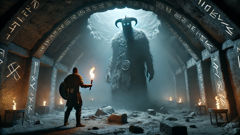
He knelt at the entrance, laying out the offerings and whispering prayers to the old gods—Odin for wisdom, Freyja for courage, Hel for mercy. But the air grew colder still, and the ground trembled beneath his knees. The opening yawned before him, black as a wolf’s mouth. With torch in one hand and ring in the other, Eirik crawled inside.
The barrow’s interior pressed close around him, walls slick with centuries of damp and decay. Strange runes glimmered faintly in the torchlight, promising protection or perhaps warning of doom. The air stank of rot and earth. Ahead, a low passage twisted deeper into darkness, ending in a stone chamber where Skjold’s body lay atop a slab, clad in corroded mail and clutching a sword crusted with rust.
But it was not alone. The Draugr loomed over its own remains—twisted, monstrous, its eyes burning with hate. It turned to Eirik, moving with impossible speed. A voice echoed within the chamber, not spoken but felt in the marrow: “You dare return?”
Eirik forced himself to his feet, raising the ring. “I bring what was stolen,” he said, his voice trembling. “Let my people be free.”
The Draugr advanced, foul breath chilling the air. Its hand shot out, seizing Eirik by the throat. Images flooded Eirik’s mind—Skjold’s life of bloodshed, betrayal by his own kin, the theft of his treasures by greedy villagers. The rage was endless, an abyss of pain. Yet Eirik sensed something deeper—a longing for justice, for memory, for peace.
Summoning every scrap of courage, Eirik pressed the ring into the Draugr’s skeletal fingers. The creature recoiled, letting out a shriek that shook the stones. The chamber filled with shadows as the Draugr writhed, its form flickering between corpse and memory. “You have honored the pact,” the voice whispered. “But blood must seal the wound.”
Eirik felt a blade slash across his forearm—a wound not fatal, but deep enough to mark him. The Draugr drew back, sinking onto its tomb with a sigh like winter wind. Its eyes faded from burning coals to dull embers. The shadows lifted. For a moment, Eirik saw not a monster but a weary old man, clutching his ring and smiling faintly.
He crawled from the barrow as dawn broke over Nordheim, bloodied but alive. The cold had lessened, and the first birds sang in the trees. Behind him, Skjoldhaugen was still once more.
Conclusion
The curse upon Nordheim lifted gradually, like fog burning away beneath the spring sun. The air lost its bitterness, livestock returned to the fields, and laughter once again echoed between timbered houses. But the memory of the Draugr lingered, etched into Eirik’s scar and in the stories whispered by fireside. He became both respected and feared—marked as one who had walked among the dead and returned. Some villagers claimed to have seen Skjold’s shadow wandering the woods at dawn, not as a monster but as a guardian watching over his people from afar.
Eirik tended his wound and learned to walk with a new humility, carrying both the burden and wisdom of his ordeal. He understood now that the old stories were not only warnings but reminders of the ties between living and dead, between memory and justice. The mounds remained untouched, honored with new offerings each year. Nordheim endured, stronger for its brush with darkness, and the legend of the Draugr became a part of its soul—a tale of terror, yes, but also one of courage, reconciliation, and respect for the mysteries that sleep beneath the earth.

